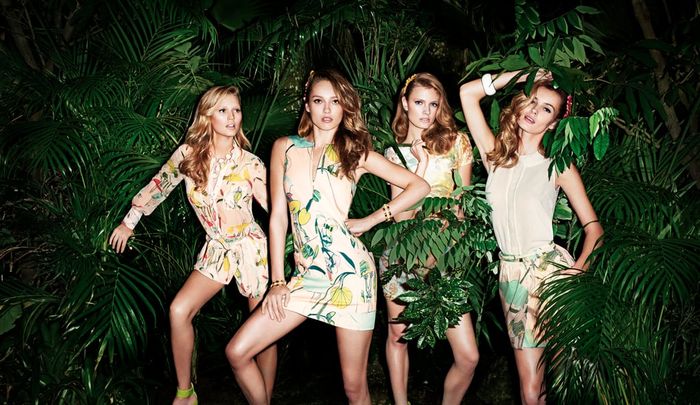FIT alumni show at New York Fashion Week labelled as ‘racist’
Amongst the provocative shows of NYFW this year was the alumni show of the FIT, which Isabel Sebode shares for the outrage it provoked in light of its racist use of obscure accessories.
Content Note: This article contains discussion of racist imagery and racism.
New York Fashion Week is renowned for its provocative looks, providing an opportunity for fashion influencers to build their reputation and designers to introduce their new collections. In order to remain memorable, brands often create eye-catching runway shows, unique themes and out-of-the-ordinary pieces.
“I was told that it was fine to feel uncomfortable for only 45 seconds.”
Yet, this NYFW, The Fashion Institute of Technology’s alumni show of the 7th of February went significantly too far. In a production concept that has been classified as racist, even if not intentionally so, models were forced to wear costumes that seemed to caricatured the African-American body. The offensive ‘accessories’ included monkey ears, oversized lips, and fake prominent eyebrows, causing features to be pointed out in a manner that reminds us of the earliest depictions of encounters between the white, Western societies and black cultures. These records exist within a history of slave trade and racial exploitation; a highly unfavourable and insensitive context for FIT’s show to be associated with.
Beyond the racial offensiveness, the lips were taken from sex-toys and given to the models to wear. This does not only result in a racist depiction of the black identity and body, but equally forced female models to present themselves in a sexually-fetishized manner, without them being asked for consent prior to the show.
After being casted for the show, the black model Amy Lefévrea was presented with the accessories and felt visibly uncomfortable with wearing the racist costume. In an interview with the New York Post, Lefévrea speaks out on her refusal to wear the accessories, pointing out to the show’s directors how the accessories implied a racial discrimination. Despite being told that she only has to ‘feel uncomfortable for 45 seconds’, Levévrea refused to wear the absurd mask, only wearing make-up instead. Even this production decision by FIT seems questionable, as Levévrea being the only model without a mask insinuates that her face is equal to the face of the white models wearing the accessories. An image representing absolute indecency on the part of FIT.
Jonathan Kyle Farmer, professor at the Fashion Institute of Technology, directed the show, whilst the designs were created by Junkai Huang, recent graduate of the FIT. According to Huang, the vision was to highlight the unfavourable features of the body, without any intentions to provide any remarks on race. Regardless of whether or not the racist appearance of the show’s concept was intended, within the ongoing discourse on racial inequality it is inexcusable for a show’s concept to have passed through various directors, producers and designers without anyone recognising the offensive connotations. Not only this, but according to Lefévrea, when she voiced her concerns about the racist costume backstage she was harshly told to stop talking and do her job.
According to the New York Post, FIT has since apologised for the racist show, stating that directors “failed … to recognize a creative statement that could have negative consequences.” A weak excuse, especially in consideration of the open discourse on racial politics. No matter the context or the occasion, no matter how provocative a recent-graduate needs to design his show to be acknowledged within the competitive fashion industry, promoting inconsiderate depictions of race and ethnicity is clearly unacceptable. As Sam Reiss, photographer, put it, “You don’t push the envelope by baiting race issues. That’s not being edgy.”
What this show has provoked is a renewed awareness regarding contemporary concerns about race and gender inequalities. Whilst society and politics are working on promoting change, it is evident that the racial privileges and blindness to existing problems are still prevalent. Fashion is a medium with the potential of providing a unifying force, such as in Namilia's show that seeks to celebrate female sexuality, or Alice+Olivia’s sustainable collection. This incident is a reminder to remain proactive and aware, as everyday racism and inaction continues to numb society, making it easier for racist imagery and depictions to somehow pass as tolerable. Evidently, racism and sexism remain impressed without our society and there is a still a need for them to be actively counterbalanced for a permanent change that does not allow for these ‘mistakes’ to occur.
 News / Downing investigates ‘mysterious’ underground burial vault 29 December 2025
News / Downing investigates ‘mysterious’ underground burial vault 29 December 2025 News / Unions protest handling of redundancies at Epidemiology Unit30 December 2025
News / Unions protest handling of redundancies at Epidemiology Unit30 December 2025 Lifestyle / Ask Auntie Alice29 December 2025
Lifestyle / Ask Auntie Alice29 December 2025 Features / ‘Treated like we’re incompetent’: ents officers on college micromanagement30 December 2025
Features / ‘Treated like we’re incompetent’: ents officers on college micromanagement30 December 2025 Science / Astronomical events to look out for over the break29 December 2025
Science / Astronomical events to look out for over the break29 December 2025











